After reading my previous blog post, Sher sent me a message saying “more quotes from your dad, please.”
Now, Sher has never met my dad, so she didn’t know that once you get him started, he won’t stop. But since Sher is currently stuck alone in an apartment in NYC, I suppose she has the time to read all of my dad’s thoughts around this pandemic. And maybe you do too?
If Sher had ever spent time with my dad and me together, she’d also know that I tend to raise objections to most everything he says. But today I’m going to exercise great restraint and let my dad speak, or I suppose in this case write, without any interruptions, even though I have so many thoughts about what he has written.
And so, over to Joe:
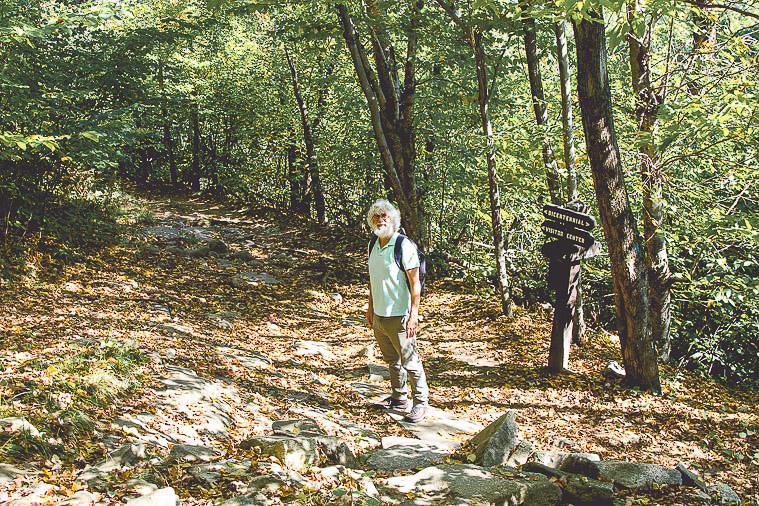
For those who travel a lot, the command to stay home is particularly hard to bear. After all, as truly veteran travelers know, staying at home means staying on the road! Life is constant transformation and change. Caterpillars transform into butterflies, seeds into trees, and, primitive primates into human beings who dart around the globe in flying machines of their own invention.
Embracing all of this richness of life is great Mother Earth herself, constantly transforming into every living being imaginable. From her perspective, birth and death are just the inbreaths and outbreaths of a life that goes on, as if forever. What glorious good fun for her, if a thimbleful of viruses traveled from a bat to a dog to a man, and then through that man quickly rode the airways to the rest of the world.
For those of us who can respond in a similar good spirit, our current dilemma represents less a catastrophe than an exciting challenge. We have known already for decades that humanity, addicted to a never-ceasing more and more, is on a collision course with nature. Now that governments have hit the pause button, blowing the whistle and ordering everyone to stay home, we have all been given the opportunity to examine our priorities and to see if fundamental changes are in order.
This in itself shows that our travel days are not over. Openness to change, even the demand for it, is what travel is all about. We are human beings, after all, a member of that proud but restless species that has ridden waves of migration to populate the entire planet—even to the point of searching out and settling some of the smallest and most remote islands in the middle of the Pacific.
Ever since 9/11 of course, helicopter parents have been keeping their children on a pretty short leash, trying to convince them that home is the only place where they can be safe. As a result, there are many young people who head off to the university and demand that its administrators take over the role of Mom and Dad, even to the point of installing surveillance cameras all over campus and warning professors not to say anything that might make their students uncomfortable.
Luckily not every young person wants to be coddled in this way. For the adventurous ones among them, travel becomes first an option and then a whole new way of life. Now that they have been told all over again to stay home, they can see clearly what is at stake. Home is not the natural refuge of humanity some have made it out to be. Instead it is no more than a way station between childhood and adulthood, between a place of rest and the active business of the day.
Homer’s Odysseus may have desperately wanted to return home to Ithaca, but something in him made him take the longest possible path to get there. Indeed, at one point he even had to descend into Hades to ask for directions. Anyone with claustrophobia may very well be wondering if these last few weeks constitute our own Hades moment. If so, let’s do what Odysseus did when he chose Achilles as the one to give directions. Dangers are best encountered by someone who is brave.
Even Immanuel Kant, a philosopher famous for never having left his home town, showed how deeply the travel instinct is lodged in the human heart. Instead of settling in and tending his bodily needs, Kant spent his days, courageously I would say, pushing the boundaries of what a person can understand.
He followed physics and astronomy into an astonishingly accurate picture of the whole physical universes. He investigated the history of the earth and the history of all of the life that has grown out of it. And in his library, he collected every travel report he could lay his hands on. With their help and the power of his own imagination, he developed an anthropology long before there were professional anthropologists, taking into consideration the lives and customs of native Americans, Africans, Tibetans, and Siberians.
He often got things wrong, of course, but so do many travelers, despite the advantages afforded by direct observation. Human beings are not easy beings to understand. Their capacity for transformation is a capacity that always points in contradictory directions. There are those who let others play upon their fears until they end up living lives that are smaller than the lives that could have been theirs. There are others who claw instinctively at whatever cocoon they are wrapped in. Intent on a life of study and travel, they take joy in learning new languages and move easily from one world to another. Steadily extending their comfort zones, they are rewarded with lives that become larger and richer than they ever could have imagined.
Every crisis that befalls us is a challenge to become something different than what we are. This applies as well to humanity as a whole in moments such as this. For humanity is in crisis, unnerved that its normal way of doing business has sent a highly contagious virus spiraling through the world faster than anyone could have imagined. A modern world seemingly addicted to an ever-accelerating rate of change has suddenly deemed it necessary to freeze everyone in their tracks, all in the hope that the galloping monster can be slowed down enough that we can adjust ourselves to it. The masters of quick adjustment to new and unfamiliar circumstances are, of course, the world’s travelers. As such, it behooves travelers in particular to ask how free spirits might rise to the challenge we have now been given.
One thing for sure, if the art of travel teaches us to adapt quickly to new and at times dangerous situations, travelers should not spend too much time curled up in a ball, while saying over and over again, “not our moment, not our moment.”
For one thing, those who travel have so much to give to others. With regard, for instance, to the sense of desperate panic that so many people are caught up in, travelers could help enormously if they were to say what travelers are famous for saying, “have no fear!” A death rate of one to every one or two hundred people (confirmed cases in the world, divided by known deaths) is a horrible thing, for it could well mean that any one of us could lose a loved one before this thing is over. But what it decisively is not is a personal death sentence.
This is a coronavirus, not the bubonic plague, certainly not anything like what the bubonic plague was in the Middle Ages when it killed one out of every two people who contracted it, while leaving survivors grotesquely crippled. For most of the people who get it, Covid-19 is nothing worse than a bad cold. In this context, a traveler’s ‘fear not” is surely a good thing for people to hear. As prudent as it is to be careful, if for no other reason than that we care about the sick and vulnerable who live around us, panic is never a good thing.
The worst danger we face is something other than the Covid-19 disease. If we fail utterly at our attempts to rein it in, a very large number of people will die sooner than they otherwise would have died. This is a serious matter, to be sure. But given the millions of children who die every year of starvation, not to speak of what nuclear war and global warming might one day accomplish, there are clearly bigger problems in the world.
Yes, it is a tragedy to lose a loved one, but this is the case whether we lose them to a random accident, an unanticipated disease, or simple old age. Death is painful because love binds us so closely together that to lose a loved one is to lose a part of ourselves. But the answer to this is not to give up on love, not to keep everyone apart in the hope that no one gets hurt. To mourn lost love is painful, to be sure, but there are moments when we can feel its beauty. All too aware of its reminder that we once belonged together we cannot entirely discount its promise of future reunion. There are moments when we gaze out at the beautiful places that tug at our hearts and feel such promise almost as a certainty.
Love gathers all things together. But the only method we have for dealing with a highly contagious disease is to keep people apart. The danger we now face is that, if people only see things through the lens of fear, they could easily fall sway to demagogues who, in the name of protection, would be all too happy to institutionalize separation. To insist too much on security is to prepare the way for a police state.
Much has been written about the dangers posed by modern instruments of surveillance and control. The authoritarian regimes of Stalin and Hitler were a nightmare for humanity, but we can at least be thankful that they did not have available to them a tool better than the radio for spreading their propaganda. And how thankful must we all be that Hitler, when he made his fateful decision to end it all, did not have a nuclear button installed in his bunker. Reminding ourselves of this should help us get the coronavirus in perspective—and it should also make it clear to us which direction we do not want to follow, regardless of how reassuringly Bill Gates and others might point that way.
An optimist by nature, I do not think that our future will entail a police state that, for the sake of concentrating power, will try to keep people from bonding together into loving communities, each with a will of its own. I believe the danger is there, that we can see that it is there, and that consequently we will avoid it. But to do so, we really do need to see the danger. Using our smart phones and computers as places to run to in order to flee a confusing world is problematic precisely to the degree that it fosters separation. On the other hand, using those same instruments to forge connections with like-minded people is just as emphatically a good thing.
But what about travel? What about that moment when we are the ones who separate ourselves from those we love and go off on our own? Could it be that there is something in us that is aware of our kinship with those far away? Could it be that a truly sensitive soul can even sense its kinship with mountains and rivers, and with the moon and the stars?
It is true that when Europeans crossed the oceans and entered the Americas, they felled trees, killed predators, and operated in accord to gruesome slogans such as, “the only good Indian is a dead one.” Instead of building a home in foreign soil, they were, by and large, determined to eradicate its foreignness. But they, on the other hand, were not the true travelers.
The true travelers were the explorers, the courageous men and women who were drawn to the wilderness as such. Instead of cutting trees and building roads, they followed the same paths that people native to the land had long shared with the animals whom they recognized as their kin. The frantic drive to destroy the wilderness and replace it with a world of our own making is rooted, of course, in fear. It is what has set modern humanity on a collision course with nature. But there is another desire that runs parallel to it, the desire to mollify our fears, while testing our capacity to find a home in foreign lands.
As long as the human spirit is alive, it remains free to roam at will. The only thing that matters at the moment is to see this: our travel days are not over. Even when stuck at home, with the hands of the clock no longer moving and time seemingly at a standstill, once the eye of the imagination comes open, the entire universe is ours to explore.
This means a good deal more than thinking about where we would like to go and what we would like to see. What we need to envision is what travel might look like in a world better than the one we inhabit.
Wild animals should be respected and left to themselves. They should not, along with everything else, be made into a commodity that is sold on the market. The virus, in other words, should not have so easily jumped from a bat to a dog to a man.
There is one aspect of the current world, in other words, that is simply going to have to go. Making the pursuit of money the primary pursuit in life was surely a mistake. Converting good farm land into money has depleted the top soil. Converting coal and oil and gas into money has not only dirtied the air, it has changed the climate in ways that are already proving to be very dangerous.
To close our eyes to such problems is, in effect, to say that the future itself is something we can sell for the sake of money. That the current crisis has closed so many businesses is, we hope, a temporary phenomenon. On the other hand, the fact that we have elected to do that does teach us one very valuable lesson: there are some things that are far more important than business as usual.
International travel should serve the purpose of fostering mutual understanding across a variety of cultures. It should certainly not come to an end, but its purpose should be reconceived. We need the challenge of learning one another’s languages and appreciating one another’s cultures. We do not need a travel industry that is based on the commodification of people’s cultural monuments and most beautiful landscapes.
The next thing we need to see clearly is the importance of living far more locally than we have been living. We can live off the land that is close to where we live and still eat well. Every building in New York City that has a flat roof should also have a garden. And that we learn to value such things, we need photographers who can show us what it looks like to live in a healthier balance with nature.
To bring gardens into Manhattan would serve a greater purpose than merely supplementing the way we get food. It would serve as a reminder that nature is what feeds us and keeps us alive. It is not simply the bearer of demon viruses and other dangers. Instead of thinking of ourselves as separate beings who are in frantic competition to see who can accumulate the most property and who can live the longest, we need to see more clearly how much we depend on one another and, just as importantly, how much we depend on the natural world that surrounds us.
In painting this romantic picture of nature, I do not want to deny that dangers lurk around every corner. But as dangerous as the coronavirus is, it is certainly not our mortal enemy. In fact, as it sweeps through our world it challenges our bodies to develop antibodies that, until now, they never had before. And as we grow stronger, more and more immune to this new danger, the coronavirus will itself take on the more modest role of being just another strand of flu.
In us, nature awakens from its eternal slumber. In and through us, nature perceives her glories. We too seek beauty. It is our duty, moreover, to record those beauties, over and over, for they serve as reminders of why we ourselves live. The earth is not a gigantic gasoline station. It is not filled with things for us to sell. The earth is our mother. And she is beautiful beyond words. Her beauty awakens in us the desire to travel.
Let us continue to do that, discovering beauties both close to home and far away.
We need to write compelling narratives of our travels. We need to help one another to see the beauty of this one world we live in together. And, instead of regarding that world as if it were ours to do with as we please, we need to understand that we belong to it far more than it belongs to us.
When great artists and poets transform their own suffering into works of beauty, they enable us to see what we should be doing in difficult moments like the one that afflicts us now. If we respond beautifully enough to beauty, we may even end up building homes that old people like me are glad to stay in for a good long while. But adorned with works of beauty, those same homes will sustain the love of life and with life, the love of travel.
And when we reach our days of final confinement, let us take joy in the life of each of those we leave behind, begging their forgiveness as we ourselves prepare to embark on our next great adventure. Not to worry, though, the stars are not nearly as distant as most people seem to think.
About the author:
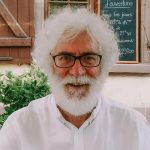
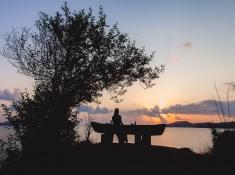
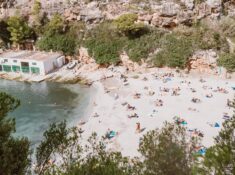 7 Prettiest Beaches in Mallorca
7 Prettiest Beaches in Mallorca
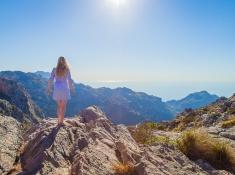
Justine says
Is it weird that I immediately shifted from reading this in your voice to totally creating a male philosopher’s slightly gruff but quiet voice in my head?
Justine says
Hahaha, just saw he’s a philosophy professor.
Silvia says
Hahaha wow that is amazing
Nicki Summers says
This is an awesome perspective. I’m from your Dad’s generation and even though I differ in perspective on some of his views, I loved reading this. And I think he enjoys that you object to or disagree with what he says. After all he clearly loves Socrates and philosophy.
william m. shea says
Sylvia,
I remember you from HC. You were a little girl then. Your photo above brings to mind a Viking like the one’s who beat up on my remote ancestors in Ireland. Nice to see you and to read what you are about. Happy Easter!
Your father is not just any old philosopher in the academic profession. He has a philosopher’s mind and heart. To my way of thinking and in my own academic experience he is unusual, maybe even unique. I could go on but I need not. You already know him to be what I have experienced and what so many of his colleagues and his students, including my own son, would testify to.
Fine blog!
ahmed says
thanks for sharing i love your post
Cindy says
“And, instead of regarding that world as if it were ours to do with as we please, we need to understand that we belong to it far more than it belongs to us.”
This really spoke to me. Thank you Joe and Silvia for sharing your thoughts. I’m fondly thinking of my own travels with the hope that one day I can go back out and explore some more. It’s a big world out there!
Cindy
Kyomi says
A stunning, throught-provoking reflection. Thanks for amplifying the voice of your father. I love his writing voice!